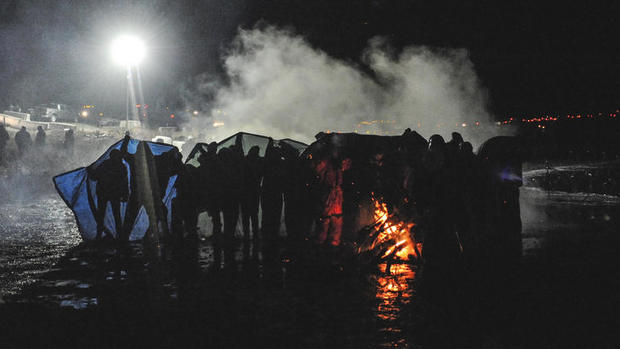John Andrist: Protests Are Mostly an Effort of Futility

Police use a water cannon to put out a fire started by protesters during a protest against plans to pass the Dakota Access pipeline near the Standing Rock Indian Reservation, near Cannon Ball, North Dakota, U.S. November 20, 2016. REUTERS/Stephanie Keith
The months long pipeline protest is apparently over, and the pipeline is now being completed as it was planned through a collaborative, lawful process.
The $3.8 billion project is expected to start moving North Dakota Bakken oil to refineries sometime in March.
If it does it is likely to bring wealth to the state and some of its “lucky” citizens that will be more substantial than the cost of the protest.
I’ve seen reliable estimates that state coffers will get additional tax money up to half a million dollars a day.
Whatever the real dangers posed by the pipeline, we will be matching with lessened fear of accidents from thousands of rail cars.
It’s difficult to find any value from the protest. It gained nothing beyond some sympathy for the tribe. It has cost the state more than $22 million that could have been better spent on other needs. It wreaked havoc on the tribe’s own economy, bringing huge deficits to the tribal casino.
Worst of all it has left an environmental nightmare for the clean-up which could sweep tons of debris from the spring melt into the river the tribe wanted to protect.
[mks_pullquote align=”right” width=”300″ size=”24″ bg_color=”#ffffff” txt_color=”#000000″]If it has achieved any new cultural awareness for Native Americans, it has also left an equal amount of contempt for the damage wrought by the inability of tribal government to work within the systems that govern us.[/mks_pullquote]
Private property losses for everything from destroyed machinery to trashed motel rooms is left in its wake. Nobody will ever know what the cost has been for legal and court activity, both private and public.
If it has achieved any new cultural awareness for Native Americans, it has also left an equal amount of contempt for the damage wrought by the inability of tribal government to work within the systems that govern us.
Just as bad, the whole business of environmentalism has lost an enormous amount of credibility. That hurts all of us, because even those of us not among the extremists care about our environment.
Clearly a large majority of the protesters encouraged by non-resident elites and their money have contributed little or nothing to their cause, if they really have a rational one.
The protest also represents another element to the reckless failure of President Obama and his EPA through their own unhelpful intervention, and for negating the work of their own Corps of Engineers.
Finally, it’s another incident in history where the system has hurt our native brothers in the name of caring about them.
My, we have done that so much, and the beat goes on.
Finding the gray between black and white
I don’t know if it’s an occupational hazard that goes with growing old, but I find a lot of gray in my life, that goes well beyond the color of my hair.
When I was young I was pretty well satisfied that I knew just about everything. Now I’m not certain about anything.
Take Renaissance Zone funding, for example. That’s the tool to help support city infrastructure development, a partnership in which cities forego real estate taxes and the state kicks in income tax credits to support new building projects.
It was started as a way to get redevelopment in the downtown cores of our cities, but both the practice and the size of Renaissance zones has grown exponentially.
Because of budgetary concerns the North Dakota House decided last week to suspend the income tax credits. Action is pending in the Senate.
Many of our smaller cities have found ways to beneficially use the credits for development. But no city has used the incentives more than Fargo, and Governor Doug Burgum may be the biggest benefactor in the state.
The Forum, like The Journal/Tribune, were highly critical of the House. I suspect most community activists concur with them.
When the enabling legislation was first passed I think I voted no. It didn’t make sense to me that western North Dakotans should share in rebuilding downtown Fargo, nor that Fargo folk should be funding downtown development in Crosby and Tioga.
Admittedly, however, we all benefit somewhat in the successes of the Fargos and the Stanleys.
What do you think? The state no longer has money to sustain the lifestyle we have built. Should income taxes be raised so we can maintain these incentives, or should we suspend the incentives?
I’m less certain than I once was. That’s what gray does to you.
The Fargo city commission seems to be somewhat more passionate about this. One of their conservative members sent a letter to the House urging an end to the incentives.
He was panned by The Forum because he used his Fargo city stationery to urge House members to pass the repeal. But the mayor and another commission member used city stationery to counter the argument.
If the Senate passes the bill it will be pretty interesting to see if Governor Burgum signs it or vetoes it.
Thankfully, I have the luxury of just watching.




